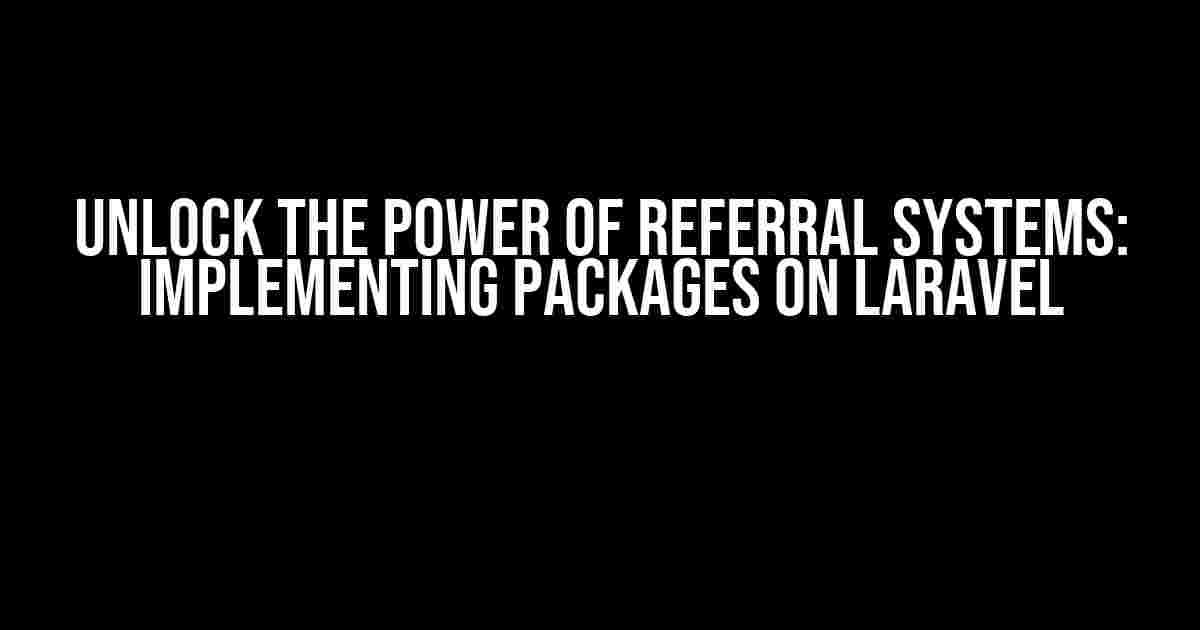Are you tired of relying on luck to grow your user base? Do you want to incentivize your existing customers to bring in new ones? Look no further! A well-designed referral system is the key to unlocking exponential growth, and Laravel is the perfect platform to build it on. In this article, we’ll dive into the world of referral system packages on Laravel, exploring the benefits, types, and implementation process.
What is a Referral System?
A referral system is a program designed to encourage users to refer new customers to your business. It rewards existing customers for each new customer they bring in, creating a win-win situation for both parties. Referral systems can be found in various forms, from simple “refer-a-friend” schemes to complex multi-tiered programs.
Benefits of Referral Systems
- Increased Customer Acquisition**: Referral systems tap into the power of word-of-mouth marketing, leveraging your existing customer base to bring in new customers.
- Improved Customer Retention**: By incentivizing customers to refer others, you create a sense of ownership and loyalty, leading to higher retention rates.
- Cost-Effective**: Referral systems are often more cost-effective than traditional marketing methods, as they rely on your existing customer base rather than expensive advertising campaigns.
- Measurable Results**: Referral systems provide trackable metrics, allowing you to monitor their effectiveness and make data-driven decisions.
Types of Referral Systems
There are several types of referral systems, each with its unique characteristics and benefits. Let’s explore some of the most popular ones:
Single-Tier Referral System
In a single-tier referral system, customers are rewarded for each new customer they bring in. This is the simplest form of referral system and is often used in “refer-a-friend” programs.
Multi-Tier Referral System
A multi-tier referral system takes it to the next level by rewarding customers not only for their direct referrals but also for the referrals made by those they’ve referred. This creates a viral effect, encouraging customers to refer more people to increase their rewards.
Hybrid Referral System
Hybrid referral systems combine elements from single-tier and multi-tier systems, offering rewards for both direct and indirect referrals. This provides a more complex but also more rewarding experience for customers.
Implementing a Referral System on Laravel
Now that we’ve covered the benefits and types of referral systems, let’s dive into the implementation process on Laravel.
Step 1: Install the Required Packages
To build a referral system on Laravel, we’ll need to install the following packages:
composer require laravel/socialite composer require laravel/referral
Step 2: Configure the Referral System
In the `config/referral.php` file, configure the referral system settings:
'enabled' => true, 'reward_type' => 'points', 'reward_amount' => 10, 'referral_code_length' => 8, 'referral_code_format' => 'alnum'
Step 3: Create the Referral Model
Create a new model `Referral.php` to store referral data:
<?php
namespace App\Models;
use Illuminate\Database\Eloquent\Model;
class Referral extends Model
{
protected $fillable = ['user_id', 'referral_code', 'reward_amount'];
}
Step 4: Generate Referral Codes
Create a new function to generate unique referral codes:
<?php
use Illuminate\Support\Str;
public function generateReferralCode()
{
$code = Str::random(8);
while (Referral::where('referral_code', $code)->exists()) {
$code = Str::random(8);
}
return $code;
}
Step 5: Implement Referral Logic
In the `User.php` model, add the referral logic:
<?php
use App\Models\Referral;
public function referFriend($friendEmail)
{
$referralCode = $this->generateReferralCode();
$referral = new Referral();
$referral->user_id = $this->id;
$referral->referral_code = $referralCode;
$referral->reward_amount = config('referral.reward_amount');
$referral->save();
// Send referral email to the friend
Mail::to($friendEmail)->send(new ReferralEmail($referralCode));
}
Step 6: Track Referrals and Rewards
In the `ReferralController.php`, create a function to track referrals and reward users:
<?php
use App\Models\Referral;
public function trackReferral(Request $request)
{
$referralCode = $request->input('referral_code');
$referral = Referral::where('referral_code', $referralCode)->first();
if ($referral) {
// Reward the user
$user = $referral->user;
$user->increment('points', $referral->reward_amount);
$user->save();
}
return redirect()->route('home');
}
| Package | Description |
|---|---|
| laravel/socialite | Socialite provides a simple, flexible way to authenticate users with OAuth providers like Facebook, Twitter, and Google. |
| laravel/referral | The Laravel Referral package provides a basic referral system, including referral code generation, tracking, and rewards. |
Conclusion
Implementing a referral system on Laravel can seem daunting, but by following these steps, you can create a powerful program to incentivize your customers to bring in new users. Remember to choose the right type of referral system for your business, and don’t be afraid to get creative with your rewards and promotions.
By leveraging the power of referral marketing, you can unlock exponential growth and take your business to the next level. So, what are you waiting for? Start building your referral system today!
<?php echo "Happy coding!"; ?>Here are the 5 Questions and Answers about “Referral system packages on Laravel” in a creative voice and tone, using HTML:
Frequently Asked Question
Getting started with referral system packages on Laravel can be a bit overwhelming, but don’t worry, we’ve got you covered!
What is a referral system package, and why do I need it on Laravel?
A referral system package is a set of pre-built functions that allow you to create and manage referral programs on your Laravel application. You need it because it helps you incentivize users to refer their friends and family, increasing user engagement and retention, and ultimately driving business growth.
How do I integrate a referral system package on Laravel?
Integrating a referral system package on Laravel is relatively straightforward. You can use Composer to install the package, and then follow the instructions provided in the package documentation to set up the tables, models, and controllers. You may also need to configure the package to fit your specific use case.
What features should I look for in a referral system package on Laravel?
When choosing a referral system package on Laravel, look for features such as customizable referral rules, reward management, referral tracking, and analytics. You should also consider the package’s scalability, security, and ease of use.
Can I customize the referral system package to fit my specific needs on Laravel?
Yes, most referral system packages on Laravel are highly customizable. You can modify the code to fit your specific use case, or use the package’s built-in customization options to tailor the referral program to your business needs.
Are referral system packages on Laravel secure and reliable?
Reputable referral system packages on Laravel are built with security and reliability in mind. They follow best practices for data encryption, access control, and error handling. However, it’s still important to review the package’s security features and follow proper security protocols when implementing the package in your application.
Let me know if you need any adjustments!




